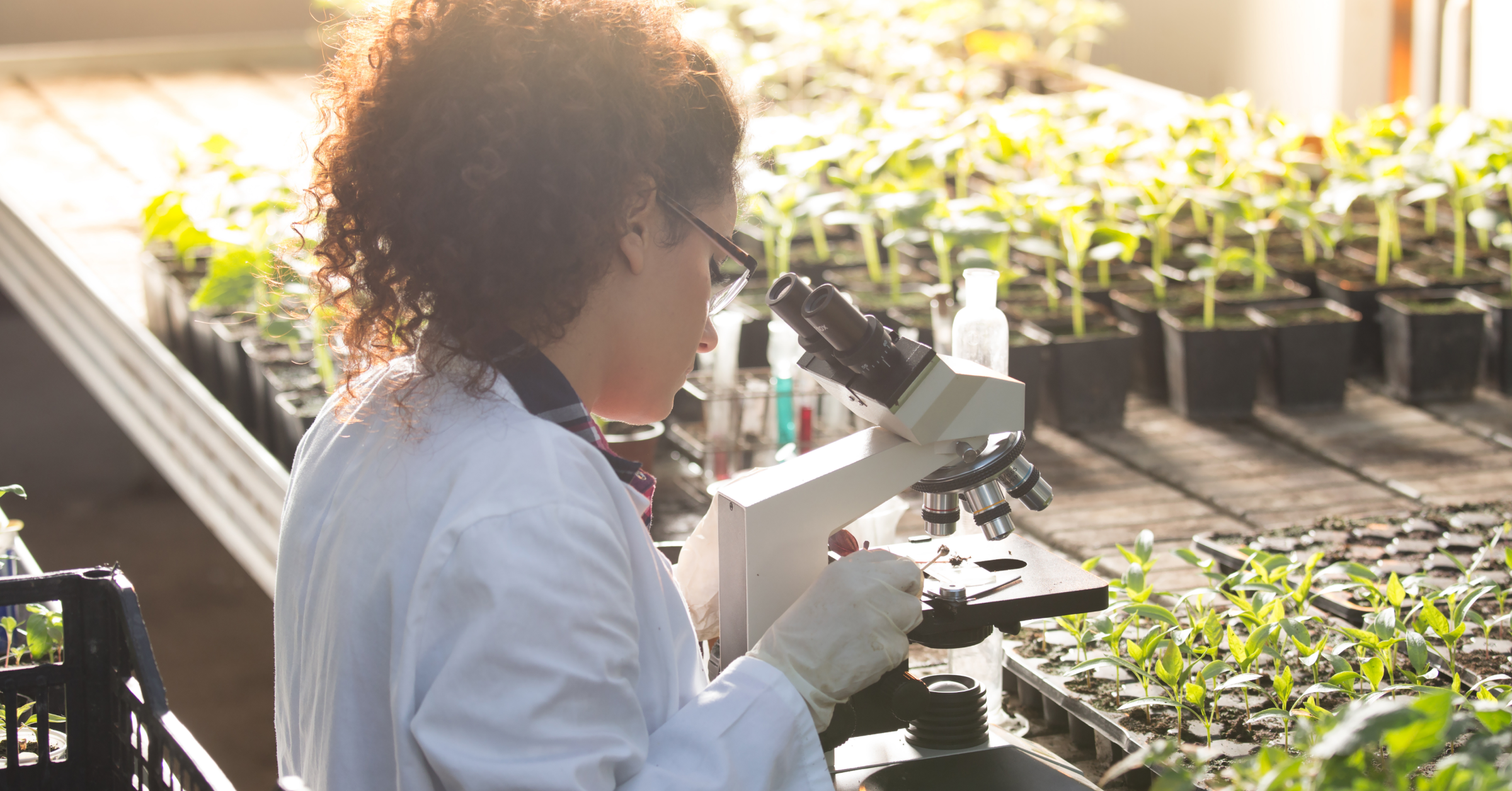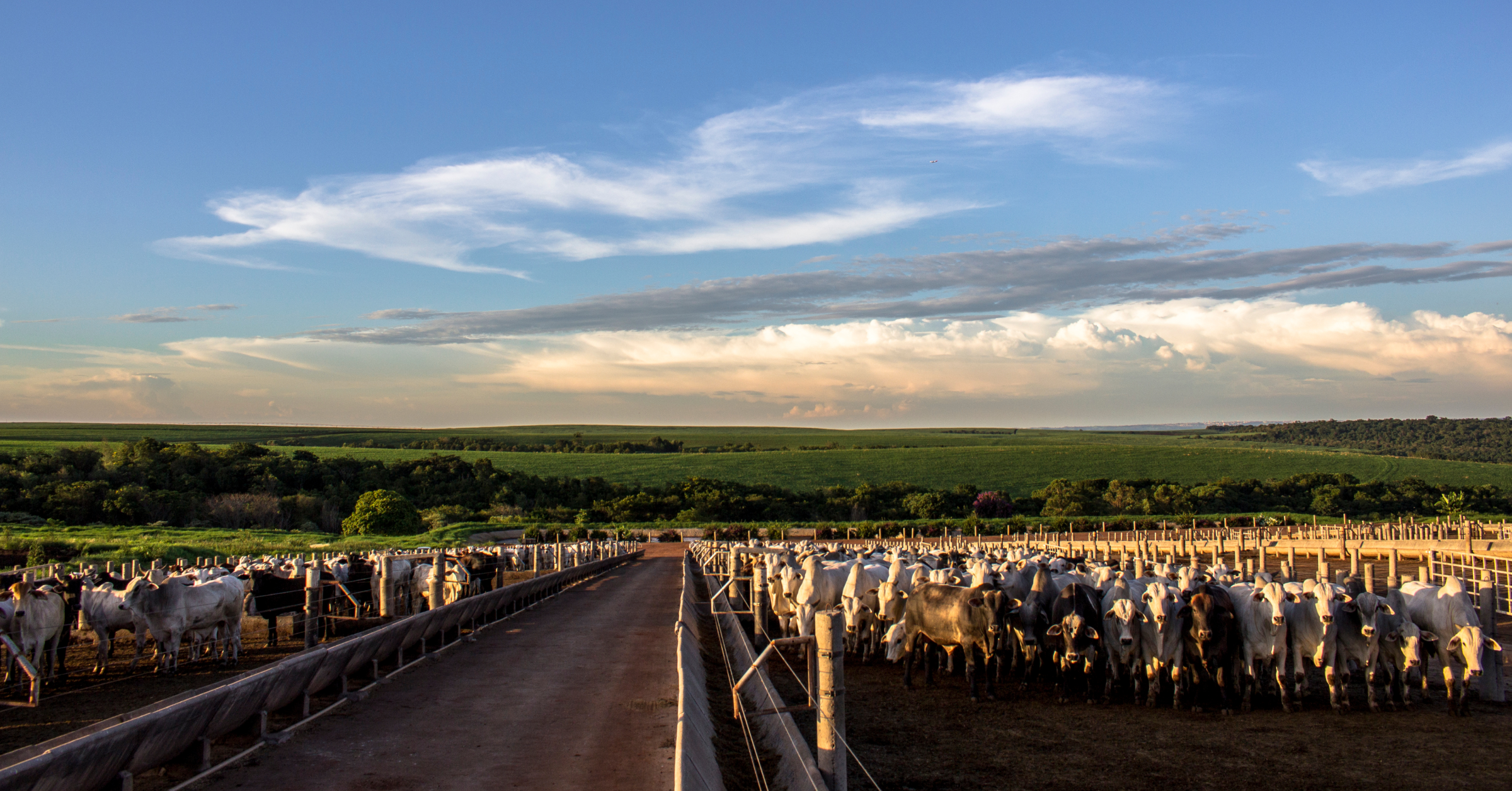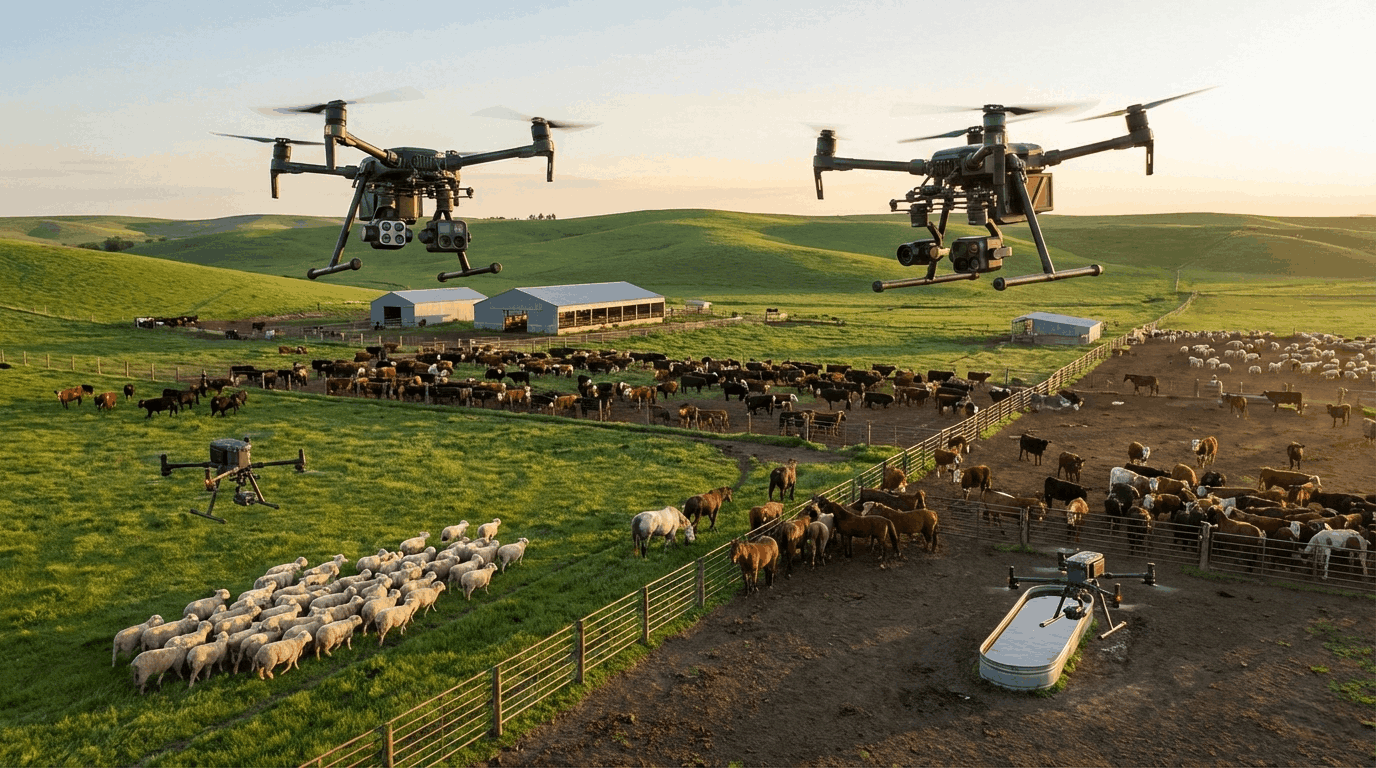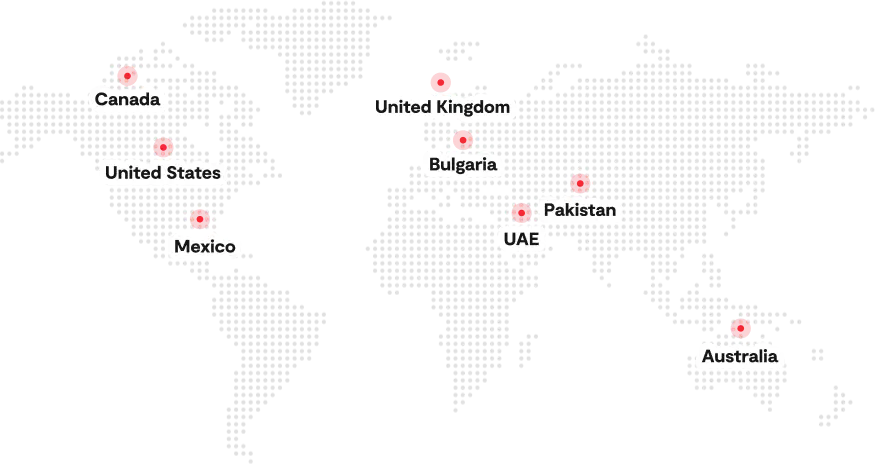Biotechnology is transforming how we grow our food, bringing science to the soil in unprecedented ways. In fact, by 2019, farmers worldwide planted roughly 190 million hectares of biotech crops, a testament to the rapid adoption of biotechnology in agriculture.
As an agriculture professional or farmer, you’ve likely heard about genetically modified seeds, biofertilizers, or gene editing. Why is everyone talking about agri-biotech, and what is the importance of biotechnology in agriculture for your farm or business? Simply put, these innovations offer new tools to boost yields, reduce crop losses, and improve nutrition in crops and livestock, addressing many of the critical challenges facing modern farmers.
In this blog, we’ll delve into agricultural biotechnology, starting with what it is and how it differs from traditional breeding, then exploring real-world applications, the tangible benefits, the challenges and risks, and the exciting future trends shaping farming.
What is Agricultural Biotechnology?
Agricultural biotechnology (agbiotech) refers to a broad range of scientific tools and techniques used to modify living organisms or parts of them to enhance agriculture. In practical terms, when we ask what biotechnology is in agriculture, it includes everything from age-old selective breeding of plants and animals to cutting-edge genetic engineering.
The key difference from traditional breeding is precision and speed: conventional cross-breeding mixes tens of thousands of genes at random, whereas modern biotech can introduce or tweak one specific gene responsible for a desirable trait. For example, instead of crossing plants for years, hoping to get a disease-resistant variety, scientists can directly insert a known resistance gene into a plant’s DNA.
This biotechnology in agriculture builds on traditional knowledge but uses advanced tools (like DNA-based techniques) to achieve improvements faster and more reliably. Whether biotechnology is used in agriculture to develop pest-resistant crops, diagnose livestock diseases, or ferment biofertilizers, the goal remains the same: to produce food, fiber, and other products more efficiently and sustainably.
Key Biotechnology Tools
Biotech relies on several core techniques, each serving a unique role in farming. Each tool plays a role in how biotechnology is used in agriculture, from breeding seeds to managing pests and improving food quality.
- Conventional plant breeding: The oldest form of agbiotech, in which breeders cross plants and select progeny with desirable traits. While not as precise as modern methods, it remains the backbone for developing new varieties.
- Tissue culture & micropropagation: Growing plant tissues on nutrient media to regenerate whole plants. Micropropagation produces disease‑free, uniform plantlets, enabling farmers to replace infected planting material. For example, tissue‑cultured bananas show consistent growth, early fruiting, and higher yields compared with conventionally propagated suckers.
- Marker‑assisted selection (MAS): Using DNA markers as flags to identify plants or animals carrying a trait (e.g., flood tolerance). MAS accelerates breeding by screening seedlings for the right genes rather than waiting for them to mature, helping develop new varieties.
- Genetic engineering/GMOs: Directly modifying an organism’s genome by inserting or altering genes. It includes transgenic crops like Bt cotton and drought-tolerant maize, as well as gene editing methods such as CRISPR or TALEN that change DNA without adding foreign genes.
- Molecular diagnostics: Techniques like PCR and ELISA to detect pathogens or specific genes, allowing early disease detection in crops or animals. These tools guide decisions such as isolating infected plants or selecting disease-resistant breeding stock.
Applications & Examples of Biotechnology in Agriculture
Biotech is applied across crops, animals, and microbes. Here are major applications of biotechnology in agriculture, with concrete examples showing its impact.

Genetic Engineering & GMOs
Genetic engineering involves transferring or editing genes to confer new traits. One hallmark example is Bt cotton, which contains a gene from the soil bacterium Bacillus thuringiensis that produces an insecticidal protein. Bt cotton reduces bollworm damage and has significantly boosted farmers’ returns.
In India, Bt cotton alone raised yields by about 24% and smallholder profits by roughly 50%. Another GM crop is drought‑tolerant maize (MON 87460), which yields about 5–20% more under severe drought than conventional maize. In the meantime, Golden Rice has been engineered to produce beta‑carotene; eating one bowl can provide 30–50% of a child’s daily vitamin A requirement, helping combat vitamin A deficiency.
Newer gene‑editing tools like CRISPR make targeted changes without adding foreign DNA. Scientists have created rice and wheat varieties resistant to fungal diseases using CRISPR. While GMOs face regulatory scrutiny and public controversy, they illustrate how genetic engineering can deliver pest resistance, stress tolerance, and improved nutrition.
Tissue Culture & Micropropagation
Not all biotech applications involve altering DNA. Tissue culture and micropropagation are lab techniques to clone plants from tiny tissue samples. By growing plant cells on sterile media, scientists produce large numbers of identical plantlets free from disease. It is particularly valuable for crops like banana, potato, and ornamentals. For example, micropropagated banana plants exhibit consistent growth, earlier fruiting, and increased yield compared with conventional planting materials. Farmers benefit from uniform, disease‑free seedlings that reduce the risk of viral or fungal infections and support higher productivity.
However, micropropagation also conserves endangered plant species by multiplying limited stock, and nurseries use it to supply high‑quality planting material year‑round. While the technique requires specialized facilities, its adoption is growing, especially for crops susceptible to viruses or with slow conventional propagation.
Marker‑Assisted & Molecular Breeding
Marker‑assisted selection (MAS) combines traditional crossing with DNA‑based screening to fast‑track breeding. Instead of waiting for plants to mature, breeders test seedlings for markers linked to desired traits. A prime example is flood‑tolerant rice (Swarna‑Sub1). Scientists identified the SUB1 gene, which helps rice survive submergence, and introduced it into popular Swarna rice using MAS. The resulting Swarna‑Sub1 can survive almost 90% of plants after two weeks of flooding and gives farmers a yield advantage of 1–3 tons per hectare over conventional Swarna in flood-prone areas.
Moreover, MAS also helps stack multiple disease‑resistance genes in wheat and maize or accelerate hybrid development by identifying superior parent lines. As breeding programs become more complex, seed management software becomes essential for tracking genetic markers, parent lines, and breeding outcomes. In addition to markers, mutation breeding using radiation or chemicals, and hybrid seed technology, crossing distinct parental lines remains an important tool. Together, these molecular breeding approaches improve stress tolerance, grain quality, and agronomic performance more rapidly and precisely than conventional selection alone.
Biofertilizers & Biopesticides
Biotech extends beyond seeds to bio‑based farm inputs. Biofertilizers are formulations of beneficial microbes that enhance nutrient uptake. For example, applying nitrogen‑fixing Rhizobium bacteria to legumes reduces the need for chemical nitrogen fertilizers. Research suggests biofertilizers can boost plant growth and yield by 10–40% and, in some applications, deliver 25% higher yields while reducing nitrogen use by 50% and phosphorus by 25%.
Similarly, biopesticides are pest control agents derived from natural organisms. The bacterial protein Bt targets caterpillars but is harmless to humans and beneficial insects. Fungal biopesticides like Beauveria bassiana or viral agents like nucleopolyhedrovirus control pests without chemical residues. Bioherbicides based on fungi attack invasive weeds. By integrating biofertilizers and biopesticides, you can improve soil health, reduce chemical input, and manage weeds and pests more sustainably. Modern pest management solutions can help you track and optimize these biological control methods alongside traditional approaches.
Biofuels & Industrial Applications
Agricultural biotechnology feeds not just the world but also fuels and materials. Biofuels such as ethanol and biodiesel are produced from crops and residues using biotech-enhanced enzymes and microbes. Improved yeast strains ferment sugars more efficiently, and enzymes derived from microbes help break down cellulose in crop residues to create cellulosic ethanol. Microalgae engineered to accumulate oils can produce biodiesel in ponds, offering high yields per acre.
Meanwhile, the adoption of GM crops and related practices has also reduced greenhouse gas emissions. Beyond fuels, biotech crops are being used to produce bioplastics like corn starch for PLA bioplastic and specialty oils that serve as renewable industrial feedstocks. These innovations open new revenue streams for farmers and reduce reliance on fossil‑based products.
Seed Quality & Plant Growth Enhancement
Biotech also improves the quality of seeds and early growth. Advanced seed production techniques, often using tissue culture and doubled‑haploid breeding, ensure hybrid seeds are genetically pure and uniform. To learn more about how modern seed farming practices are evolving with biotechnology, these innovations represent a significant shift in agricultural production. Seeds can be coated with beneficial microbes, such as plant growth–promoting rhizobacteria (PGPR) or mycorrhizal fungi, which colonize roots and help plants absorb nutrients and fend off pathogens.
As a result, it leads to more vigorous seedlings, better root development, and improved stress tolerance. Seed priming, soaking seeds in nutrient or hormone solutions, can hasten germination and enhance stand establishment, giving crops a head start. With these enhancements, you reap more consistent and resilient stands, which ultimately translate into higher yields.
Aquaculture & Animal Applications
Biotechnology isn’t confined to crops; it’s transforming aquaculture and livestock. In fish farming, genetically engineered salmon carry a growth hormone gene that enables them to reach market weight in 16–18 months instead of 3 years, improving feed efficiency and supply. Managing these advanced aquaculture operations requires sophisticated aquaculture management systems to track growth, health, and production metrics.
In livestock, reproductive technologies like embryo transfer and in vitro fertilization propagate superior genetics, while gene editing has produced pigs resistant to diseases such as porcine reproductive and respiratory syndrome (PRRS). Breeding management software helps farmers track genetic lineages and optimize these advanced reproductive programs. Biotech-derived animal vaccines are another success: a genetically engineered vaccine rescued Hawaii’s papaya industry from ringspot virus, and similar approaches protect livestock against foot‑and‑mouth disease.
Even as feed ingredients are changing, microbial or algae-based omega‑3 oils can replace fish meal in aquaculture, reducing pressure on wild fisheries. Together, these innovations show how applications of biotechnology in agriculture extend to animals and aquaculture, enhancing productivity and animal welfare.
Benefits of Biotechnology in Agriculture
What are the uses of biotechnology in agriculture? Biotech innovations have yielded concrete benefits for farmers and society. Below are key advantages of biotechnology in agriculture, backed by research and data:
Increased Yields & Farm Efficiency
One of the most compelling reasons to adopt biotechnology is higher productivity. A meta‑analysis found that GM crops, which include Bt cotton, corn, and others, increase yields by 22% and profits by 68% while cutting pesticide use by 37%. These yield gains mean farmers grow more food on the same land; from 1996 to 2018, biotech improvements produced an additional 278 million tons of soybeans and 498 million tons of corn that wouldn’t have existed otherwise. Without biotech, farmers would have needed over 20 million extra hectares to achieve the same production. The efficiency gains are particularly significant for smallholders; for example, Bt cotton farmers in India saw yields increase by 24% and profits by 50%. Herbicide-tolerant crops simplify weed control and enable conservation tillage, saving labor and fuel. Overall, higher yields and efficiency improve food security and support your bottom line.
Stress Tolerance & Pest Resistance
Biotechnology equips crops with built-in defenses against stresses that would otherwise devastate harvests. Drought-tolerant maize developed via genetic modification produces 5–20% more grain under severe drought than its conventional counterpart, ensuring more reliable production as climate variability increases. Flood-tolerant Sub1 rice can survive prolonged submergence and yields 1–3 t/ha more after floods. Pest-resistant crops like Bt cotton, Bt eggplant, and Bt corn protect against insects without heavy pesticide use; in Bangladesh and the Philippines, Bt eggplant increased yields by 51% and reduced pesticide costs by 37%. Widespread planting of Bt crops can even reduce pest populations regionally, protecting neighboring non-Bt fields. These stress-tolerant and pest-resistant varieties help stabilize farm income, reduce crop losses, and lower the risk of catastrophic failure.
Nutritional Enhancement
Biotech helps fight malnutrition by improving the nutritional profile of staple crops. A genetically modified potato dubbed the Protato contains about 48% more protein than ordinary potatoes by incorporating a gene from the protein-rich amaranth plant. Gene editing has also yielded high‑oleic soybeans, with more than 80% oleic acid, thanks to TALEN-edited FAD2‑1A/B and FAD3A genes. Such oils are healthier for consumers because they contain higher monounsaturated fats. Similarly, gene-edited high‑GABA tomatoes (released in Japan) contain elevated levels of gamma‑aminobutyric acid, which may help reduce blood pressure. These examples demonstrate how agricultural biotechnology can turn staple crops into “nutrient powerhouses,” offering affordable, healthier food options.
Environmental & Sustainability Benefits
Biotech contributes to environmental sustainability in multiple ways. The adoption of GM crops from 1996 to 2018 reduced pesticide spraying by 776 million kilograms, an 8.6% global reduction in active ingredient use. Herbicide-tolerant crops enable no‑till farming, which conserves soil, reduces erosion, and increases soil organic matter. Biotech’s yield gains reduce pressure to convert forests and grasslands into farmland; without those gains, millions more hectares would need cultivation.
Additionally, the reduced fuel use from fewer tractor passes and conservation tillage, combined with carbon sequestration in soils, resulted in a 23.6 billion kilogram reduction of CO₂ emissions, equivalent to 15.3 million cars taken off the road for a year. GM crops are also being developed to address specific environmental issues, such as plants that emit less methane or trees that can clean up contaminated soil. Together, these innovations show how biotechnology in agriculture supports climate-smart and sustainable farming.
Economic & Social Benefits
Adopting biotech crops often translates into significant economic gains. The same meta-analysis that reported yield and pesticide reductions found average profit increases of 68% for farmers. In developing countries, smallholders benefit the most: Bt cotton farmers in India improved their profits by roughly 50%, while Bt eggplant farmers in Bangladesh saved on pesticides and increased net income by nearly US$400 per hectare. Beyond farm income, biotech can reduce drudgery (less time spent weeding or spraying chemicals), improve worker health by cutting exposure to toxic pesticides, and enhance food security and stability in rural economies. These benefits of biotechnology in agriculture show how science-driven innovations can uplift communities when implemented responsibly.
Challenges and Risks with Agricultural Biotechnology
Despite its advantages, biotechnology raises legitimate concerns. Understanding these disadvantages of biotechnology in agriculture is essential to make informed choices.
Regulatory Frameworks
Biotech products undergo rigorous regulation to ensure safety. Bringing a new genetic trait to market is expensive and slow: between 2017 and 2022, the average cost of discovery, development, and regulatory approval for a biotech trait was US$115 million, with about 37.6% of that cost devoted to regulatory activities. The process is lengthy too: the regulatory phase alone takes roughly 204.5 months, and the total time from concept to commercialization is 16.5 years. These costs limit participation to large firms and delay innovation for crops that might benefit smallholders.
Public Perception
Public acceptance of GM foods lags behind scientific consensus. A U.S. survey found that 88% of scientists with the American Association for the Advancement of Science (AAAS) believe GM foods are safe to eat, but only 37% of U.S. adults agree. Misinformation and emotional debates have led to GMO labeling mandates, import bans, and protests in some countries. For farmers and agribusinesses, public perception can affect market access and regulatory approvals, emphasizing the need for transparent communication and consumer engagement.
Biodiversity
Critics worry that biotech crops may harm biodiversity through gene flow to wild relatives and by promoting monocultures. While strict regulations assess these risks before approval, gene flow remains a concern: some herbicide-tolerant crops can cross with related weeds, potentially spreading resistance traits. At the same time, overreliance on a few biotech varieties can narrow the genetic base of crops. Maintaining refuges of non-GM plants and preserving heritage varieties are strategies to protect biodiversity.
Economic Barriers
High R&D and regulatory costs mean biotech innovations are often developed by large multinationals, creating concerns about market concentration and seed pricing. Many of the leading agriculture companies are investing heavily in biotech research, though public–private partnerships and open-source biotechnology can help ensure equitable access. Farmers may have to buy new seeds each season due to licensing agreements, which can increase expenses. Crops tailored to poor regions, like cassava or orphan grains, may lack commercial incentives, slowing development. Public–private partnerships and open-source biotechnology can help ensure equitable access and reduce these barriers.
Resistance Build‑Up
Nature adapts. Heavy use of a single herbicide or Bt toxin can select for resistant pests and weeds. For instance, more than 30 weed species in the United States are now resistant to glyphosate, including Palmer amaranth and waterhemp, forcing farmers to apply additional herbicides or adopt other control methods. Likewise, pink bollworm evolved resistance to Bt cotton in India. To sustain biotech benefits, integrated pest management strategies such as rotating crops, mixing herbicides, and planting refuges are essential.
Ethical Concerns
Biotech raises ethical questions about “playing God,” patenting life, and equitable benefit sharing. Some critics argue that transferring genes across species boundaries violates natural order, while others worry that benefits accrue disproportionately to corporations rather than farmers. Religious and cultural perspectives differ: some faith groups approve biotech under certain conditions, whereas others oppose it on principle. Transparent governance, respect for cultural values, and fair access to technology are critical to addressing these ethical challenges.
Future Trends & Innovations in Agriculture Biotechnology
Agricultural biotechnology is a dynamic field, and the next decade promises even more exciting developments. Here are some future trends in biotechnology in agriculture that you, as a farmer or ag professional, might be hearing about:
CRISPR & Precision Gene Editing
Gene editing tools like CRISPR‑Cas9 allow scientists to make precise changes in DNA. Compared with transgenic methods, CRISPR can knock out or modify genes without adding foreign DNA, potentially easing regulatory hurdles. Gene-edited crops such as high‑oleic soybeans and disease-resistant rice are already in development. In livestock, CRISPR is being used to create hornless cattle and disease-resistant pigs. These innovations could deliver targeted traits with fewer regulatory and public acceptance barriers.
Omics & Data‑Driven Breeding
Advances in genomics, transcriptomics, proteomics, and metabolomics (collectively “omics”) are revolutionizing breeding. Sequencing costs have fallen, enabling breeders to map genes for complex traits like drought tolerance. Combined with machine learning, these datasets accelerate selection and allow digital breeding to predict a plant’s performance from its DNA profile. Omics also help identify beneficial microbes for biofertilizers and reveal nutritional compounds for biofortification.
Synthetic Biology
Synthetic biology goes beyond editing existing genes to designing new biological systems. Scientists are engineering microbes to fix nitrogen for non‑legume crops, potentially reducing fertilizer use. Others are developing yeast that ferments milk proteins or algae that produce renewable chemicals. Synthetic biology could turn farms into biofactories for fuels, plastics, and pharmaceuticals, but it raises new biosafety and ethical questions.
Precision Agriculture Integration
Biotechnology and precision agriculture are converging. Sensors, drones, and AI guide variable-rate planting, irrigation, and spraying, optimizing the performance of biotech crops. Understanding the broader impact of technology in agriculture helps contextualize how biotech fits into the digital transformation of farming. Seed companies are developing bright seeds coated with sensors or microbes that signal water stress to irrigation systems. DNA barcoding can trace seeds and products through supply chains, enhancing food safety and authenticity. Precision tools will help realize the full potential of biotech traits by delivering inputs exactly when and where needed.
Gene Drives & Novel Approaches
Looking further ahead, gene drives, genetic systems that bias inheritance, are being explored to control pests like malaria-carrying mosquitoes or invasive rodents. Agricultural applications could include gene drives in locusts or fruit flies to suppress populations. While promising, gene drives raise ecological and ethical issues and remain under research. Continued innovation, regulatory evolution, and societal dialogue will shape the adoption of these cutting-edge technologies.
Conclusion
Biotechnology has become integral to modern agriculture. We have seen how the use of biotechnology in agriculture encompasses tools ranging from tissue culture and marker-assisted selection to genetic engineering and gene editing. These technologies deliver tangible benefits: higher yields, improved nutrition, reduced pesticide use, economic gains, and environmental sustainability. At the same time, challenges like regulatory hurdles, public perception, biodiversity conservation, economic equity, resistance management, and ethical dilemmas demand thoughtful consideration. As an agriculture professional or farmer, staying informed and evaluating biotech options for your specific context is crucial. Implementing agricultural ERP solutions can help you manage the complexity of modern biotech farming operations, from seed selection to harvest and market delivery. When applied responsibly and transparently, biotechnology in agriculture can help feed a growing world while preserving resources and enhancing livelihoods.
FAQs
Why is Biotechnology Used in Agriculture?
Biotechnology is used in agriculture to help you grow healthier, more resilient crops. It protects plants from pests, boosts resistance to droughts and floods, prevents soil erosion, conserves biodiversity, and enhances the nutritional quality of food.
When was Biotechnology First Used in Agriculture?
Biotechnology in farming has roots as old as agriculture itself, starting with early selective breeding around 10,000 BCE. Modern biotechnology, which uses genetic engineering, began in the late 20th century, with the first genetically modified plant created in 1983 and the first GM food approved for sale in 1994.
How Can Biotechnology Help Farmers?
Biotechnology helps farmers like you grow more food with fewer resources. It reduces the need for costly inputs, improves pest and weed management, and supports conservation practices like reduced tillage. As a result, it leads to healthier soil, cleaner water, and better air quality.
What are the Four Major Biotech Crops?
The four most widely grown biotech crops are soybeans, maize (corn), cotton, and canola. These crops are adopted across 26 countries for their proven ability to boost yields and reduce environmental impact.





